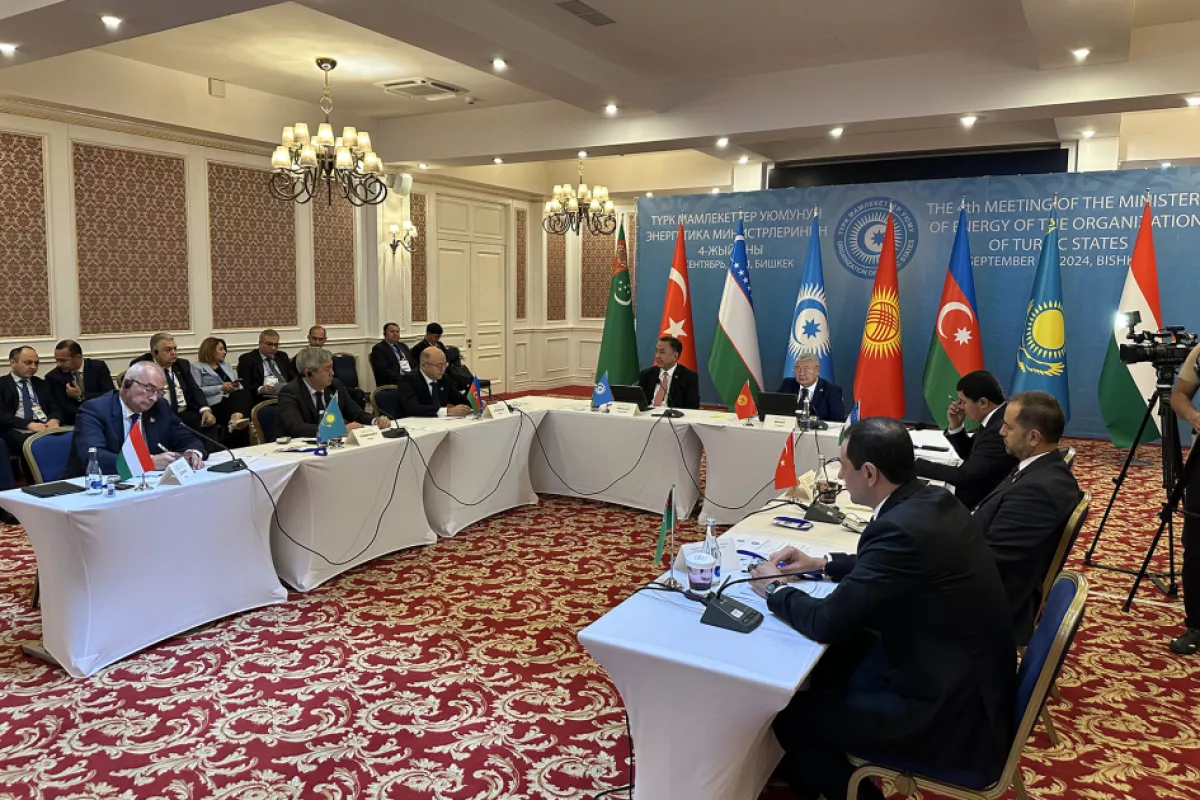Azerbaijan and OTS partners enhance energy cooperation with new initiatives “Green aspirations”
In recent years, Azerbaijan and its partners in the Organization of Turkic States (OTS) have stepped up their joint efforts to expand transport corridors and implement new joint energy projects, including within the framework of the "green" agenda. The fourth meeting of the energy ministers of the OTS countries held on September 16 in the capital of Kyrgyzstan, Bishkek, was another step in this direction.
As part of the joint communiqué signed following the forum, the ministers expressed support for the idea of creating a Coordinating Committee of the OTS on Energy and a Regional Center for Technologies and "Green" Initiatives. The heads of energy departments also welcomed the initiatives to develop energy corridor projects for the export of renewable electricity to Europe.
The development of the Trans-Caspian transit corridor has been a key vector of cooperation between Azerbaijan, Türkiye and the Central Asian countries for about twenty years. Since 2008, Kazakh oil, and since 2010, Turkmen oil, has been delivered by tankers and then via the Baku-Tbilisi-Ceyhan (BTC) pipeline through Turkish transit terminals to world markets. In particular, over the past years, over 33 million tons of Turkmen oil alone have been exported, including in 2023, the transit volumes of Turkmen raw materials via BTC exceeded 3 million tonnes, with an increase of 18%. Echelons with fuel and other oil products from Turkmenistan and other Central Asian countries also followed a similar sea route, using the railways of Azerbaijan and Georgia to the port of Kulevi.
In the past, millions of tonnes of Kazakh oil were transshipped through the ports and pipelines of Azerbaijan, but after the energy crisis ten years ago, this route was temporarily out of use. However, after geopolitical changes in the Eurasian region, Kazakhstan's KazMunayGas and the State Oil Company of Azerbaijan (SOCAR) signed an agreement providing for the transportation of Kazakh oil through the BTC pipeline system: last year, 1.392 million tonnes of oil were transshipped, moreover, the government of Kazakhstan plans to increase oil transit through Azerbaijan to 3 million tonnes by the end of 2025, in connection with which the possibility of transporting Kazakh oil through the Baku-Supsa oil pipeline is also being studied. In general, oil transit along the Middle Corridor is growing dynamically, and according to the State Statistics Committee of the Republic of Azerbaijan, in January-July 2024, 3.2 million tonnes of raw materials from the listed Central Asian countries were transshipped through Azerbaijan, with an increase of 10.5%.

However, trade and economic ties within the OTS are not limited to the traditional transit of energy raw materials and are now reaching a qualitatively new cooperation level. In particular, the implementation of projects in the oil and gas sector has been identified as a promising area of Azerbaijan-Uzbekistan cooperation in the energy sector, and recently the relevant companies of the two countries - the State Oil Company of Azerbaijan (SOCAR) and Uzbekneftegaz OJSC - agreed to cooperate in the joint development of oil fields in Azerbaijan and Uzbekistan.
“Today we actively cooperate in various spheres, together with the State Oil Company SOCAR we are starting geological exploration works on the Ustyurt Plateau in Uzbekistan. In our turn, we are ready to implement a project on production of ‘green’ energy with subsequent export through Azerbaijan to European countries. I am confident that this is just the beginning of our comprehensive strategic cooperation in the energy sector,” Uzbek Minister of Investment, Industry and Trade Laziz Kudratov noted not long ago, speaking at a forum within the framework of Azerbaijani President Ilham Aliyev's two-day state visit to Uzbekistan.
In addition to Tashkent, other regional partners - Astana and Ashgabat - are also showing similar interest in the Trans-Caspian transit of “green” electricity. A “Memorandum of Cooperation on the Integration of Energy Systems” between Azerbaijan, Kazakhstan and Uzbekistan was signed in Tashkent on 1 May 2024. This document is designed to stimulate the implementation of joint goals towards the production of electricity from renewable energy sources and its export through the territory of Azerbaijan, as well as the integration of energy systems and the organisation of the efficient use of alternative energy resources. Within the framework of the green electricity transfer project, Azerbaijan, Uzbekistan in partnership with Kazakhstan are planning to construct a 2,450-kilometre DC power transmission line, and a feasibility study of the project is currently being prepared. The cable will extend to Georgia, where it will be connected to an underwater energy bridge across the Black Sea as part of the Black Sea Energy project, thus ensuring the transit of green electricity from Central Asian countries to European markets.
Turkmenistan is another promising partner in the Central Asian region: last year this country also officially expressed its readiness to supply electricity to Azerbaijan and Türkiye via the Caspian Sea.
Moreover, apparently, the member countries of the UTC do not intend to put off the above-mentioned initiatives for a long time. Last Monday in Bishkek, during the fourth meeting of the energy ministers of the Organization of Turkic States, a joint communiqué was signed: the heads of the relevant departments of Azerbaijan, Türkiye, Kazakhstan, Kyrgyzstan and Uzbekistan expressed support for the idea of creating a Coordinating Committee of the UTC on energy, a Regional Center for Technologies and Green Initiatives, as well as projects to develop corridors for the transhipment of electricity produced in the renewable energy sources (RES) segment. The document also reflects the readiness of the Turkic-speaking states to actively participate in Energy Day on November 15 during the UN climate conference COP29 in Baku.

Speaking in Bishkek, Azerbaijani Energy Ministry Parviz Shahbazov noted that the meeting participants assessed the potential of the Black Sea Energy, Azerbaijan-Kazakhstan-Uzbekistan "green" corridor projects, as well as the prospects of the Azerbaijan-Türkiye-Europe corridor passing through the Nakhchivan Autonomous Republic in the context of the energy partnership of the Turkic states and the energy transition in Eurasia.
"In the near future, it is planned to sign the ‘Intergovernmental Agreement on Strategic Partnership in the Development and Transfer of Green Energy between Azerbaijan, Kazakhstan and Uzbekistan’, as well as to strengthen cooperation in the field of renewable energy with Kyrgyzstan. In turn, within the framework of COP29, it is planned to hold an Investment Forum on the Energy Transition of Central Asian Countries, which will be another opportunity to demonstrate the development of our cooperation for the purposes of ‘green’ energy," Shahbazov added.
The traditional hydrocarbon energy sector was also addressed at the Bishkek meeting. Azerbaijan's Energy Minister Parviz Shahbazov and Türkiye's Deputy Minister of Energy and Natural Resources, Ahmet Berat Çonkar, discussed the agenda of Azerbaijani-Turkish energy cooperation.
“In Bishkek, we discussed with Deputy Minister of Energy and Natural Resources of Türkiye Ahmet Berat Chonkar the Türkiye-Azerbaijan Interaction Project through Nakhchivan, the Igdir-Nakhchivan gas pipeline to be commissioned by the end of the year, the next meeting of the Azerbaijan-Türkiye Energy Forum and other issues on our Energy Cooperation agenda” Shahbazov said.








